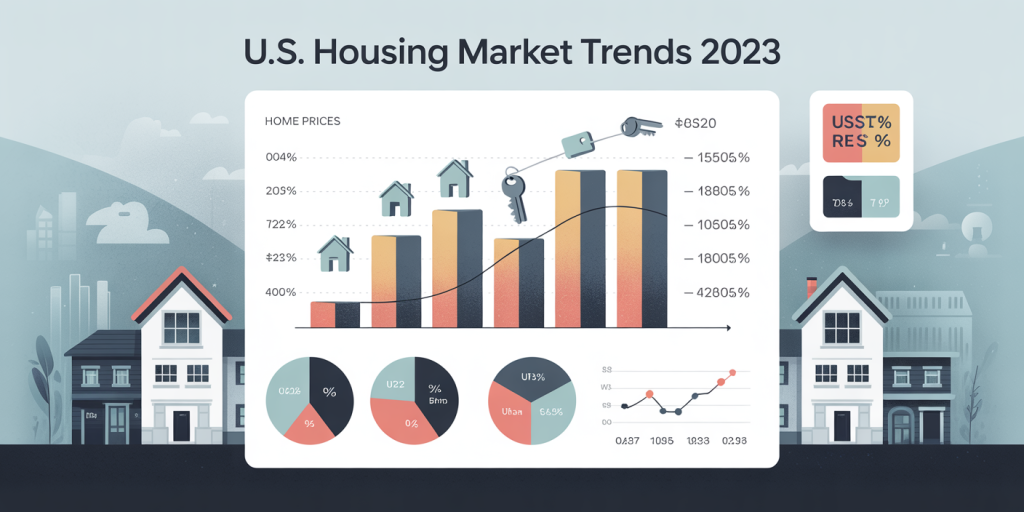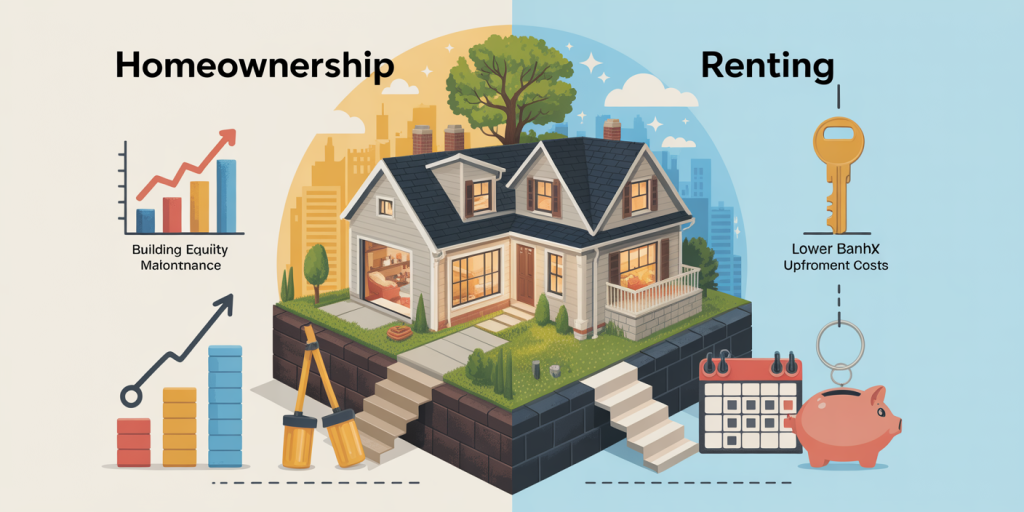Deciding whether to rent or buy a home is one of the most significant financial decisions an individual can make. This decision depends on numerous factors including financial stability, lifestyle preferences, market conditions, and long-term goals. The choice impacts not only your monthly budget but also your investments, flexibility, and overall quality of life. This article explores the key considerations, advantages, and drawbacks of both renting and buying, enriched with practical examples and current market data to help you make an informed decision.

Understanding the Current Housing Market Landscape
The real estate market has seen considerable fluctuations over the past decade, influenced by economic conditions, interest rates, and demographic trends. For instance, in 2023, the U.S. housing market experienced a notable surge in home prices, with the median home price rising by 8.5% annually (National Association of Realtors). Simultaneously, rental prices increased by approximately 5% in urban areas, driven by a growing population and limited inventory.

This evolving situation poses different challenges and opportunities for renters and buyers. The COVID-19 pandemic reshaped housing preferences, with many opting for suburban homes over city apartments, affecting demand on both sides. Understanding these market dynamics is crucial before committing to either renting or buying.
Financial Implications: Costs Beyond the Surface
One of the most critical factors in the rent vs. buy debate is the financial impact. On the surface, renting often appears cheaper due to lower upfront costs. Renters typically only pay the monthly rent, a security deposit, and occasionally utilities. Conversely, buyers face down payments, closing costs, property taxes, homeowners insurance, and maintenance expenses.
For example, let’s consider a mid-sized city where the average monthly rent is $1,500, while a comparable home can be purchased for $300,000 with a 20% down payment ($60,000). The mortgage payment on a $240,000 loan at a 6.5% interest rate would be approximately $1,518 per month excluding taxes and insurance.
| Expense Type | Renting (Monthly) | Buying (Monthly Equivalent) |
|---|---|---|
| Rent / Mortgage | $1,500 | $1,518 |
| Utilities & Fees | $150 | $150 |
| Maintenance | N/A | $200 |
| Property Taxes | N/A | $300 |
| Homeowner’s Insurance | N/A | $100 |
| Total Approximate | $1,650 | $2,268 |
As illustrated, the cost to own can be significantly higher. However, buyers build equity over time, whereas renters do not. According to a 2023 report by Zillow, homeowners accumulate an average net worth 44 times greater than renters, largely due to home equity appreciating over time.
Flexibility and Lifestyle Considerations
Renting typically offers greater flexibility. Leases range from month-to-year terms, allowing renters to relocate for jobs, family, or lifestyle changes without the burden of selling a property. This flexibility is ideal for young professionals, students, or those in volatile job markets.
Conversely, buying a home is a long-term commitment. Selling a property can take months and involve fees such as agent commissions (usually around 5-6% of sale price). Homeowners often prefer to stay in the house for at least five to seven years to offset transaction costs and benefit from appreciation. For example, a young couple in a tech industry job in San Francisco might choose to rent for three years due to the industry’s fast-paced changes, then buy once their career stabilizes.
Moreover, renters often have fewer maintenance responsibilities, with landlords managing repairs. Homeowners must budget both time and money for upkeep, which in some cases can unexpectedly rise, for example, a roof replacement costing $8,000-$12,000.
Investment and Equity Building
Purchasing a home is often seen as an investment. Besides providing housing, it builds equity — the portion of the home a buyer truly owns. Over time, this value may appreciate. Historically, real estate prices in the U.S. have increased at an average of 3-5% annually.
Consider a buyer who purchases a $250,000 home with a 20% down payment. After a year, if the property appreciates by 5%, the home’s value increases by $12,500. The owner’s equity rises accordingly beyond the mortgage principal paid.
Renters, while saving on upfront costs, do not gain equity. Instead, rent payments contribute to the landlord’s mortgage and profit margins. However, renting allows for savings to be invested elsewhere, such as stock markets, which may yield higher returns in some conditions. According to a 2022 study by the Federal Reserve, the average annual return on stocks is approximately 7% after inflation, surpassing average home price appreciation.
Tax Implications and Benefits
Homeownership offers specific tax advantages that renters do not enjoy. Mortgage interest and property taxes are often tax-deductible, potentially lowering annual tax liabilities. For instance, in 2023, a homeowner with a $240,000 mortgage paying $15,600 annual interest and $3,600 property taxes could deduct these expenses, reducing taxable income and effectively decreasing the cost of ownership.
Renters receive no such deductions. However, some states offer renter’s credits, but these are modest compared to homeowner benefits. It is important to note that tax laws evolve, and changes post the 2017 Tax Cuts and Jobs Act have limited deductions for some high-income property owners.
Comparative Summary: Renting vs. Buying
| Factor | Renting | Buying |
|---|---|---|
| Upfront Costs | Low (security deposit, first/last month) | High (down payment, closing costs) |
| Monthly Payments | Rent + utilities | Mortgage, taxes, insurance, maintenance |
| Flexibility | High (short-term leases) | Low (long-term commitment) |
| Equity Building | None | Yes, property ownership and appreciation |
| Maintenance | Typically landlord’s responsibility | Owner’s responsibility |
| Tax Benefits | Limited | Mortgage interest and property tax deductions |
| Market Risk | No exposure to property value changes | Subject to market fluctuations |
| Long-term Financial Benefit | Generally less | Potentially more with appreciation |
Practical Real-Life Case Studies

To illustrate these points, examine two real-life examples:
Case 1: Sarah, a 28-year-old Marketing Specialist in Austin, TX Sarah earns $70,000 annually and plans to stay in Austin for at least seven years. She rents a one-bedroom apartment at $1,400/month. With current home prices averaging $350,000 for a modest home, she opts to buy after saving $70,000 for the down payment. Over seven years, she benefits from increased home equity, with home values appreciating nearly 6% yearly, complementing her investment portfolio and providing stability.
Case 2: James, a 34-year-old Consultant in New York City James earns $120,000 but anticipates moving frequently for job assignments every 2-3 years. NYC real estate prices are exceptionally high, with median homes costing over $800,000. James chooses to rent to maintain flexibility and invest savings in diversified ETFs rather than tying capital in a highly volatile housing market.
Looking Ahead: Future Trends and Considerations
Housing preferences and economic conditions will continue to influence the rent vs. buy question. The rise of remote work could reshape demand, with suburban and rural areas becoming more attractive for buyers seeking space, while city apartments remain popular for younger renters.
Interest rates remain crucial. In 2023, the Federal Reserve’s incremental rate hikes to control inflation pushed mortgage rates above 6%, reducing affordability for many buyers. Should rates drop, buying becomes more accessible, potentially shifting the balance back towards ownership.
Additionally, innovations like rent-to-own schemes, co-living spaces, and real estate crowdfunding are emerging, offering blended alternatives. These hybrid approaches may change the traditional dichotomy between renting and buying in the next decade.
Environmental sustainability also drives new decisions; owning a home allows investments in energy-efficient upgrades, solar panels, and smart home systems, potentially lowering long-term costs and increasing home value.
—
In summary, the decision to rent or buy hinges on individual financial situations, lifestyle needs, and market conditions. Buyers build equity and benefit from tax breaks but bear higher costs and responsibilities. Renters enjoy flexibility and lower upfront costs but miss out on long-term wealth accumulation. Being informed, financially prepared, and mindful of future trends will empower you to make the best choice for your unique circumstances.